教学课件 --冀教版中学英语七年级(下) UNIT3 Unit Review
文档属性
| 名称 | 教学课件 --冀教版中学英语七年级(下) UNIT3 Unit Review | 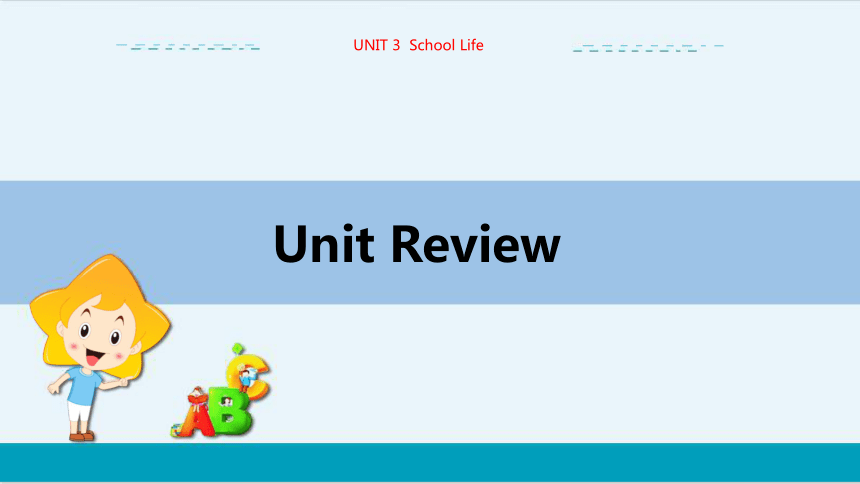 | |
| 格式 | pptx | ||
| 文件大小 | 5.0MB | ||
| 资源类型 | 试卷 | ||
| 版本资源 | 冀教版 | ||
| 科目 | 英语 | ||
| 更新时间 | 2024-02-21 19:48:13 | ||
图片预览

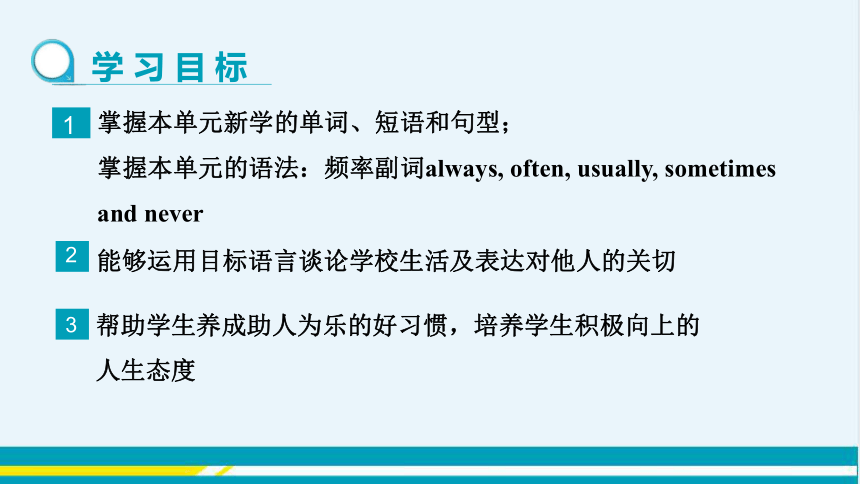
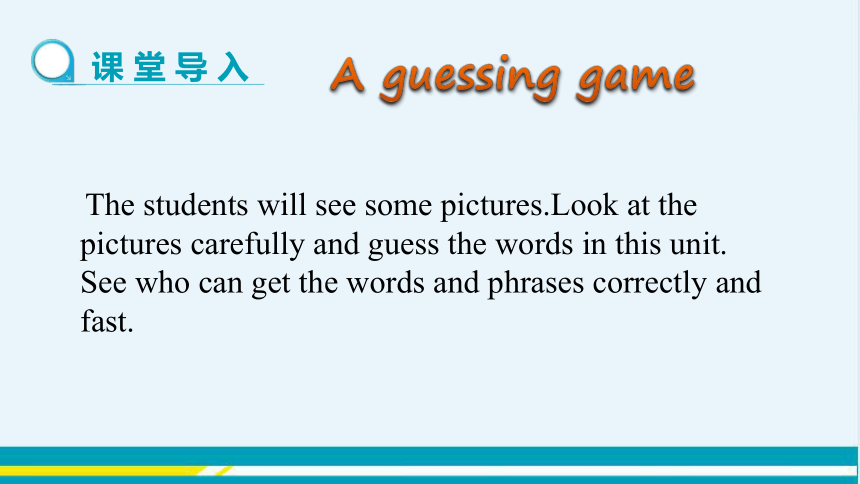
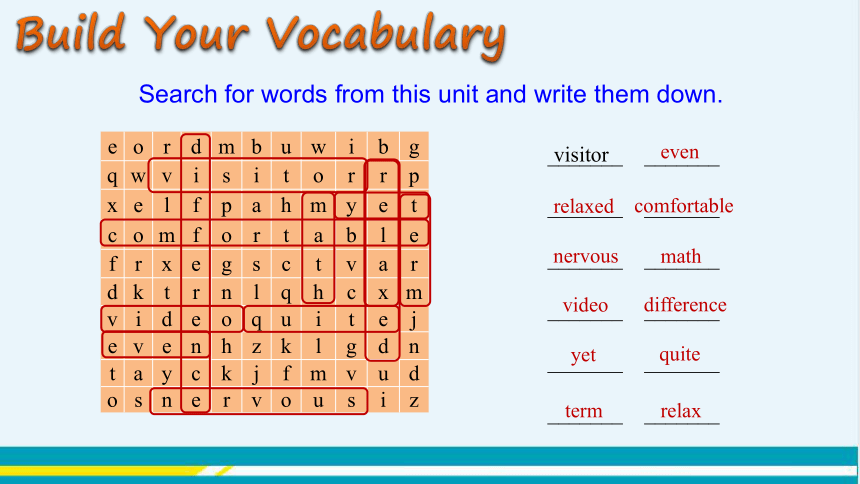
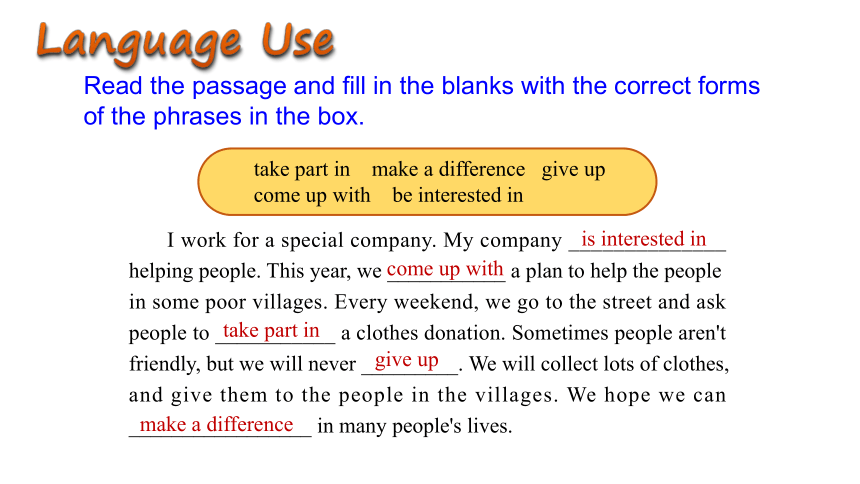
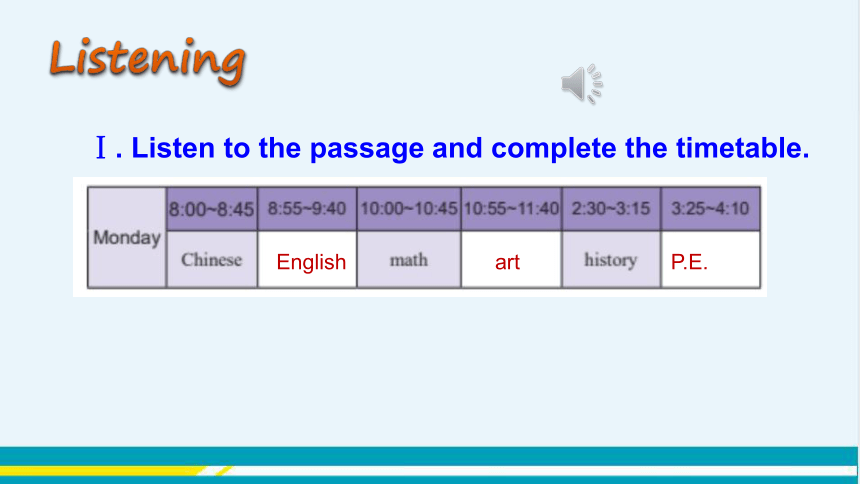
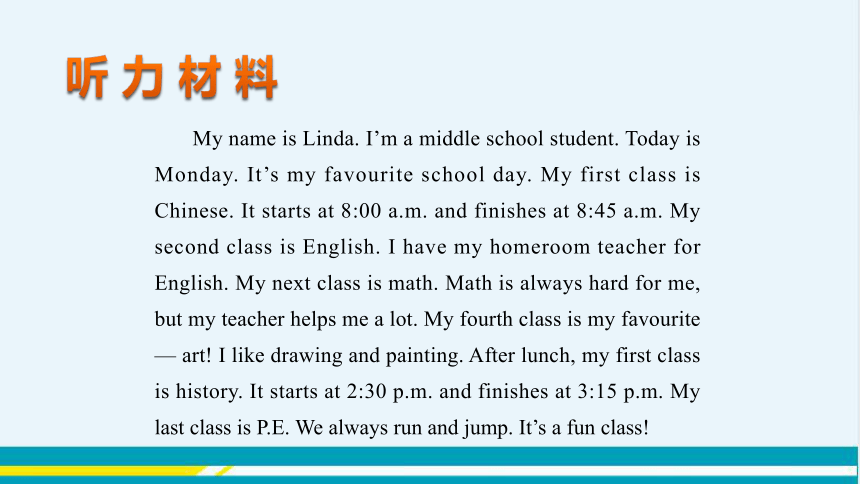
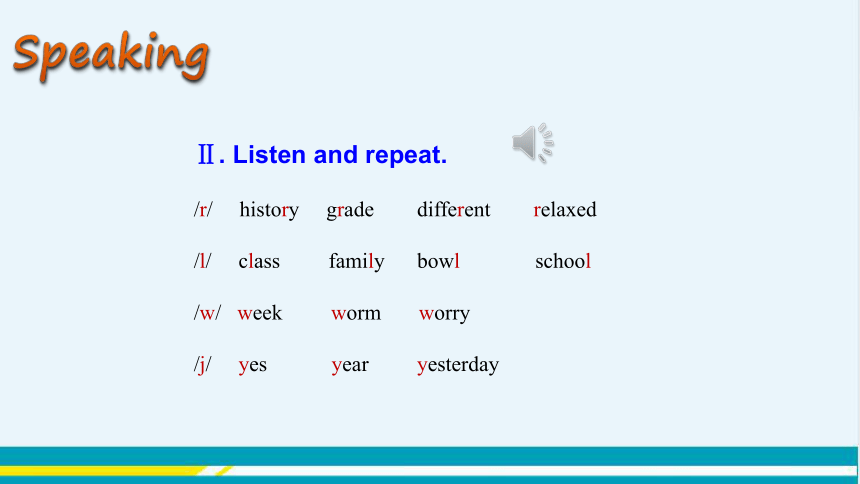
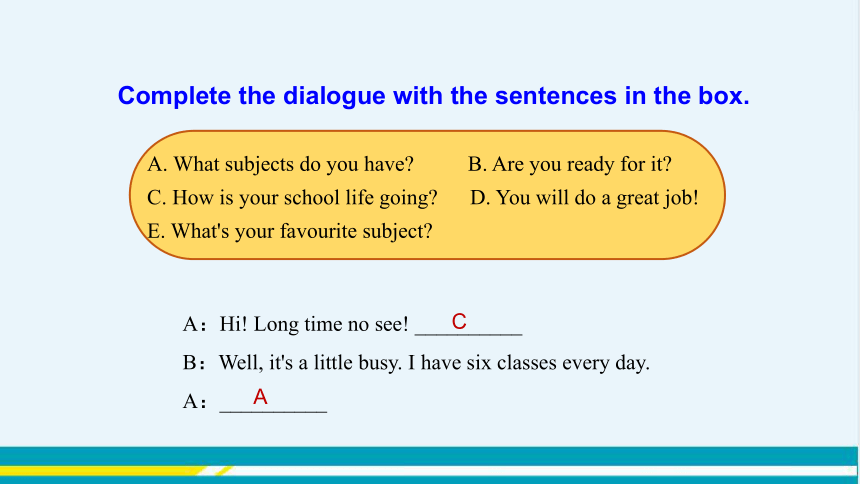
文档简介
(共28张PPT)
Unit Review
UNIT 3 School Life
学 习 目 标
掌握本单元新学的单词、短语和句型;
掌握本单元的语法:频率副词always, often, usually, sometimes and never
1
3
帮助学生养成助人为乐的好习惯,培养学生积极向上的人生态度
能够运用目标语言谈论学校生活及表达对他人的关切
2
课 堂 导 入
A guessing game
The students will see some pictures.Look at the pictures carefully and guess the words in this unit. See who can get the words and phrases correctly and fast.
e o r d m b u w i b g
q w v i s i t o r r p
x e l f p a h m y e t
c o m f o r t a b l e
f r x e g s c t v a r
d k t r n l q h c x m
v i d e o q u i t e j
e v e n h z k l g d n
t a y c k j f m v u d
o s n e r v o u s i z
Search for words from this unit and write them down.
_______ _______ _______ _______ _______ _______
_______ _______
_______ _______
_______ _______
visitor
even
relaxed
comfortable
nervous
math
video
difference
yet
quite
term
relax
Build Your Vocabulary
Read the passage and fill in the blanks with the correct forms of the phrases in the box.
take part in make a difference give up come up with be interested in
I work for a special company. My company ______________ helping people. This year, we ___________ a plan to help the people in some poor villages. Every weekend, we go to the street and ask people to ___________ a clothes donation. Sometimes people aren't friendly, but we will never _________. We will collect lots of clothes, and give them to the people in the villages. We hope we can _________________ in many people's lives.
is interested in
come up with
take part in
give up
make a difference
Language Use
Ⅰ. Listen to the passage and complete the timetable.
English
art
P.E.
Listening
听力材料
My name is Linda. I’m a middle school student. Today is Monday. It’s my favourite school day. My first class is Chinese. It starts at 8:00 a.m. and finishes at 8:45 a.m. My second class is English. I have my homeroom teacher for English. My next class is math. Math is always hard for me, but my teacher helps me a lot. My fourth class is my favourite — art! I like drawing and painting. After lunch, my first class is history. It starts at 2:30 p.m. and finishes at 3:15 p.m. My last class is P.E. We always run and jump. It’s a fun class!
Ⅱ. Listen and repeat.
/r/ history grade different relaxed
/l/ class family bowl school
/w/ week worm worry
/j/ yes year yesterday
Speaking
Complete the dialogue with the sentences in the box.
A. What subjects do you have B. Are you ready for it
C. How is your school life going D. You will do a great job!
E. What's your favourite subject
A:Hi! Long time no see! __________
B:Well, it's a little busy. I have six classes every day.
A:__________
C
A
B:Chinese, English, math and some others.
A:__________
B:Math. I'm going to take part in the math
competition next week.
A:__________
B:I hope so. I worked hard and my teacher helped me a lot.
A:Don't worry. __________
B:Thank you.
E
B
D
Writing. Imagine there is a new student at your school. He is scared and nervous. Write a letter to tell him about your school and school life. Try to make the new student feel comfortable and welcome.
Task tips:
What classes do you have at your school
What do you do in each class
How many students are in your class
How are the teachers and students at your school
Is your school big
Do you like your school
Putting It All Together
Dear Danny,
How is it going I’d like to tell you something about our school life. Our school isn’t very big, but it’s clean. We have classes of English, Chinese, maths, science, art and so on. There are forty-six students in our class. Twenty-two boys and twenty-four girls. We are all good friends. Our teachers are very kind to us. We all like our school. Don't be nervous! You'll like our school.
Yours,
Li Ming
An Example:
Find more examples from this unit. Then mark your stars.
Ⅰ. Talking about School
How is your school life going
__________________________________________
__________________________________________
__________________________________________
I can talk about my life at school in English.
I have four classes in the morning and two classes in the afternoon.
We have English, Chinese, maths, art, P.E. and so on.
I arrive at school at 7:30 a.m. and classes start at 8:00 a.m.
Self-Evaluation
Ⅱ. Expressing Care and Concern
Don’t worry, Jenny. ________________________________________________________________________________________
I can express care and concern in English.
Don’t be afraid.
Take it easy.
Ⅲ. Adverbs: always, often, usually, sometimes and never
always
She always helps us in every possible way. _____________________________________________
_____________________________________________
_____________________________________________
_____________________________________________
We always have a big party on my birthday.
She's always ready with advice.
It’s always rainy in summer.
Ⅲ. Adverbs: always, often, usually, sometimes and never
often
I often take part in the long jump. _____________________________________________
_____________________________________________
usually
We usually play songs as a class. _____________________________________________
_____________________________________________
She doesn't often wear heels.
Old houses are often damp.
She usually wears long skirts.
He usually gets up at 6 in the morning.
Ⅲ. Adverbs: always, often, usually, sometimes and never
sometimes
Sometimes we make things with clay. ___________________________________________
___________________________________________
Sometimes I go to school by taxi.
Sometimes we eat out of doors.
Ⅲ. Adverbs: always, often, usually, sometimes and never
never
Now, I never miss a day of school. _____________________________________________
I can use “always”, “often”, “usually”, “sometimes” and “never” properly.
He never be late for school.
Sing a Song
频率副词
一、在某一时间段内表示动作发生频率的副词就是频度副词。
常见的频度副词有usually、 sometimes、 always、 often、seldom、never等,它们表示的频率有所不同。
常见的频度副词按频率大小排列如下:
always(100%)>usually(80%)>often(70%)>sometimes(50%)>seldom(20%)> never(0%)
Grammar
二、频度副词在句中的位置
频度副词在句中习惯上位于系动词、助动词、情态动词之后,行为动词之前。
(1)在系动词之后。
如:She is sometimes very busy.她有时很忙。
(2)在助动词或情态动词之后。
如:I will never forget this lesson.
我将永远忘不了这一课。
(3)在实义动词之前。
如:We often go there.我们常去那儿。
★sometimes可放在句首、句中或句末,often也可放在句末(一般不放在句首)。
如:Sometimes she writes to me.=She writes to me sometimes.她有时候给我写信。She writes to me often.她经常给我写信。
★如果有两个助动词,频度副词通常放在第一个助动词后面。
如:We have never been invited to one of their parties.我们从未被邀请去参加他们的聚会。
She must sometimes have wanted to run away.
她有时候一定想过要逃走。
Rewrite the sentences using the following words.
★★★★★★ always ★★★★★☆ usually
★★★☆★☆ often ☆★☆☆★☆ sometimes
☆☆☆☆☆☆ never
Do you have good habits
I __________ get up very early.
I __________ have breakfast.
I __________ work hard at school.
I __________ do some exercise
I __________ eat vegetables and fruits.
I __________ do my homework.
I __________ help with the housework.
I __________ try to speak more English.
I __________ try to speak more English.
How many stars did you get
If you got 32 stars or more, you have good habits!
If you got less than 24 stars, you need to do better!
1. 频率副词的用法
2. 谈论学校生活
3. 本单元的生词及交际用语
Sum up
用方框中所给的单词或短语填空
1.Li Lei is very kind and ready to help others.
2.Mary is an honest girl. She tells a lie.
3.What time do you get up
4.— do you play computer games
—Once a week.
5.My mother often goes to work by bike, but by bus.
always, usually, sometimes, never, how often
always
never
usually
How often
sometimes
课 堂 达 标
Remember the new words and expressions we learnt in UNIT 3.
Homework
Thank you !
Unit Review
UNIT 3 School Life
学 习 目 标
掌握本单元新学的单词、短语和句型;
掌握本单元的语法:频率副词always, often, usually, sometimes and never
1
3
帮助学生养成助人为乐的好习惯,培养学生积极向上的人生态度
能够运用目标语言谈论学校生活及表达对他人的关切
2
课 堂 导 入
A guessing game
The students will see some pictures.Look at the pictures carefully and guess the words in this unit. See who can get the words and phrases correctly and fast.
e o r d m b u w i b g
q w v i s i t o r r p
x e l f p a h m y e t
c o m f o r t a b l e
f r x e g s c t v a r
d k t r n l q h c x m
v i d e o q u i t e j
e v e n h z k l g d n
t a y c k j f m v u d
o s n e r v o u s i z
Search for words from this unit and write them down.
_______ _______ _______ _______ _______ _______
_______ _______
_______ _______
_______ _______
visitor
even
relaxed
comfortable
nervous
math
video
difference
yet
quite
term
relax
Build Your Vocabulary
Read the passage and fill in the blanks with the correct forms of the phrases in the box.
take part in make a difference give up come up with be interested in
I work for a special company. My company ______________ helping people. This year, we ___________ a plan to help the people in some poor villages. Every weekend, we go to the street and ask people to ___________ a clothes donation. Sometimes people aren't friendly, but we will never _________. We will collect lots of clothes, and give them to the people in the villages. We hope we can _________________ in many people's lives.
is interested in
come up with
take part in
give up
make a difference
Language Use
Ⅰ. Listen to the passage and complete the timetable.
English
art
P.E.
Listening
听力材料
My name is Linda. I’m a middle school student. Today is Monday. It’s my favourite school day. My first class is Chinese. It starts at 8:00 a.m. and finishes at 8:45 a.m. My second class is English. I have my homeroom teacher for English. My next class is math. Math is always hard for me, but my teacher helps me a lot. My fourth class is my favourite — art! I like drawing and painting. After lunch, my first class is history. It starts at 2:30 p.m. and finishes at 3:15 p.m. My last class is P.E. We always run and jump. It’s a fun class!
Ⅱ. Listen and repeat.
/r/ history grade different relaxed
/l/ class family bowl school
/w/ week worm worry
/j/ yes year yesterday
Speaking
Complete the dialogue with the sentences in the box.
A. What subjects do you have B. Are you ready for it
C. How is your school life going D. You will do a great job!
E. What's your favourite subject
A:Hi! Long time no see! __________
B:Well, it's a little busy. I have six classes every day.
A:__________
C
A
B:Chinese, English, math and some others.
A:__________
B:Math. I'm going to take part in the math
competition next week.
A:__________
B:I hope so. I worked hard and my teacher helped me a lot.
A:Don't worry. __________
B:Thank you.
E
B
D
Writing. Imagine there is a new student at your school. He is scared and nervous. Write a letter to tell him about your school and school life. Try to make the new student feel comfortable and welcome.
Task tips:
What classes do you have at your school
What do you do in each class
How many students are in your class
How are the teachers and students at your school
Is your school big
Do you like your school
Putting It All Together
Dear Danny,
How is it going I’d like to tell you something about our school life. Our school isn’t very big, but it’s clean. We have classes of English, Chinese, maths, science, art and so on. There are forty-six students in our class. Twenty-two boys and twenty-four girls. We are all good friends. Our teachers are very kind to us. We all like our school. Don't be nervous! You'll like our school.
Yours,
Li Ming
An Example:
Find more examples from this unit. Then mark your stars.
Ⅰ. Talking about School
How is your school life going
__________________________________________
__________________________________________
__________________________________________
I can talk about my life at school in English.
I have four classes in the morning and two classes in the afternoon.
We have English, Chinese, maths, art, P.E. and so on.
I arrive at school at 7:30 a.m. and classes start at 8:00 a.m.
Self-Evaluation
Ⅱ. Expressing Care and Concern
Don’t worry, Jenny. ________________________________________________________________________________________
I can express care and concern in English.
Don’t be afraid.
Take it easy.
Ⅲ. Adverbs: always, often, usually, sometimes and never
always
She always helps us in every possible way. _____________________________________________
_____________________________________________
_____________________________________________
_____________________________________________
We always have a big party on my birthday.
She's always ready with advice.
It’s always rainy in summer.
Ⅲ. Adverbs: always, often, usually, sometimes and never
often
I often take part in the long jump. _____________________________________________
_____________________________________________
usually
We usually play songs as a class. _____________________________________________
_____________________________________________
She doesn't often wear heels.
Old houses are often damp.
She usually wears long skirts.
He usually gets up at 6 in the morning.
Ⅲ. Adverbs: always, often, usually, sometimes and never
sometimes
Sometimes we make things with clay. ___________________________________________
___________________________________________
Sometimes I go to school by taxi.
Sometimes we eat out of doors.
Ⅲ. Adverbs: always, often, usually, sometimes and never
never
Now, I never miss a day of school. _____________________________________________
I can use “always”, “often”, “usually”, “sometimes” and “never” properly.
He never be late for school.
Sing a Song
频率副词
一、在某一时间段内表示动作发生频率的副词就是频度副词。
常见的频度副词有usually、 sometimes、 always、 often、seldom、never等,它们表示的频率有所不同。
常见的频度副词按频率大小排列如下:
always(100%)>usually(80%)>often(70%)>sometimes(50%)>seldom(20%)> never(0%)
Grammar
二、频度副词在句中的位置
频度副词在句中习惯上位于系动词、助动词、情态动词之后,行为动词之前。
(1)在系动词之后。
如:She is sometimes very busy.她有时很忙。
(2)在助动词或情态动词之后。
如:I will never forget this lesson.
我将永远忘不了这一课。
(3)在实义动词之前。
如:We often go there.我们常去那儿。
★sometimes可放在句首、句中或句末,often也可放在句末(一般不放在句首)。
如:Sometimes she writes to me.=She writes to me sometimes.她有时候给我写信。She writes to me often.她经常给我写信。
★如果有两个助动词,频度副词通常放在第一个助动词后面。
如:We have never been invited to one of their parties.我们从未被邀请去参加他们的聚会。
She must sometimes have wanted to run away.
她有时候一定想过要逃走。
Rewrite the sentences using the following words.
★★★★★★ always ★★★★★☆ usually
★★★☆★☆ often ☆★☆☆★☆ sometimes
☆☆☆☆☆☆ never
Do you have good habits
I __________ get up very early.
I __________ have breakfast.
I __________ work hard at school.
I __________ do some exercise
I __________ eat vegetables and fruits.
I __________ do my homework.
I __________ help with the housework.
I __________ try to speak more English.
I __________ try to speak more English.
How many stars did you get
If you got 32 stars or more, you have good habits!
If you got less than 24 stars, you need to do better!
1. 频率副词的用法
2. 谈论学校生活
3. 本单元的生词及交际用语
Sum up
用方框中所给的单词或短语填空
1.Li Lei is very kind and ready to help others.
2.Mary is an honest girl. She tells a lie.
3.What time do you get up
4.— do you play computer games
—Once a week.
5.My mother often goes to work by bike, but by bus.
always, usually, sometimes, never, how often
always
never
usually
How often
sometimes
课 堂 达 标
Remember the new words and expressions we learnt in UNIT 3.
Homework
Thank you !
同课章节目录
- Unit 1 A Trip to the Silk Road
- Lesson 1 A Trip to China
- Lesson 2 Meet You in Beijing
- Lesson 3 A Visit to Xi'an
- Lesson 4 A Visit to Lanzhou
- Lesson 5 Another Stop along the Silk Road
- Lesson 6 Jenny's Diary
- Unit 2 It's Show Time!
- Lesson 7 What's Your Project about?
- Lesson 8 Marco Polo and the Silk Road
- Lesson 9 Danny's School Project
- Lesson 10 Music and Dance
- Lesson 11 Food in China
- Lesson 12 A Blog about the Silk Road
- Unit 3 School Life
- Lesson 13 How Is School Going?
- Lesson 14 Jenny's School Life
- Lesson 15 Making a Difference
- Lesson 16 We Are with You!
- Lesson 17 School Science Fai
- Lesson 18 Teaching in China
- Unit 4 After-School Activities
- Lesson 19 A Dinner Date
- Lesson 20 Join Our Club!
- Lesson 21 What Is Your Club Type?
- Lesson 22 Big Plans for the Weekend
- Lesson 23 A Weekend with Grandma
- Lesson 24 How was Your Weekend?
- Unit 5 I Love Learning English!
- Lesson 25 A Phone Friend
- Lesson 26 Online Phone Calls
- Lesson 27 Amazing English
- Lesson 28 How Do I Learn English?
- Lesson 29 A Door to the World
- Lesson 30 Writing an E-mail in English
- Unit 6 Seasons
- Lesson 31 What Strange Weather!
- Lesson 32 I Can't Wait for Winter!
- Lesson 33 Kim's Favourite Season
- Lesson 34 Steven's Report
- Lesson 35 Surfing in Sydney
- Lesson 36 Spring in China
- Unit 7 Sports and Good Health
- Lesson 37 You Are What You Eat!
- Lesson 38 Stay Healthy!
- Lesson 39 Danny's Report
- Lesson 40 Move Your Body
- Lesson 41 Were People Healthy Then?
- Lesson 42 Know Yourself
- Unit 8 Summer Holiday Is Coming!
- Lesson 43 Have a Good Summer!
- Lesson 44 Volunteering in Summe
- Lesson 45 Baseball Season
- Lesson 46 Get Ready for Summer Holiday!
- Lesson 47 Summer Plans
- Lesson 48 Li Ming's Summer Holiday
